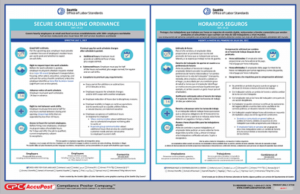 Earlier this year, we reported on Seattle, Washington’s adoption of a new Secure Scheduling law which requires employers to provide employees of large retailers and food service establishments who work within Seattle city limits with an estimate of hours the employee can expect to work per week for the upcoming year, to post work schedules two weeks in advance, and to offer any additional hours to existing employees before external employees are hired.
Earlier this year, we reported on Seattle, Washington’s adoption of a new Secure Scheduling law which requires employers to provide employees of large retailers and food service establishments who work within Seattle city limits with an estimate of hours the employee can expect to work per week for the upcoming year, to post work schedules two weeks in advance, and to offer any additional hours to existing employees before external employees are hired.
The law also requires employers to post a notice informing employees of their rights in the workplace in English and the primary languages spoken in the workplace. Although the law was effective July 1, Seattle just released the Secure Scheduling Ordinance posting in Spanish. With that release, we have created a bilingual version of the poster so that employers can easily comply with language requirements. We are anticipating additional languages to be supported in the coming weeks.
Employers are reminded that the Secure Scheduling Ordinance applies to:
- hourly employees who work for a covered employer at least 50% of the time within City limits
- retail and food service establishments with 500+ employees worldwide
- full-service restaurants with 500+ employees and 40+ full-service restaurant locations worldwide
The official notice informs employees of their rights to:
- a good faith estimate of the number of hours an employee can expect to work
- work schedules posted two weeks in advance
- make scheduling requests, and in particular for “major life events”
- rest between shifts and “clopening” pay (an opening shift that follows a closing shift)
- 3 days’ posted notice of additional available hours
- premium pay for schedule changes after the work schedule has been posted
- exceptions to premium pay requirements
- immigration status, underscheduling and retaliation protections
- services available from the Office of Labor Standards
Seattle joins a number of jurisdictions that have already enacted predictable scheduling laws, including San Francisco (CA), San Jose (CA), Emeryville, (CA), New York City (NY) and Oregon.
